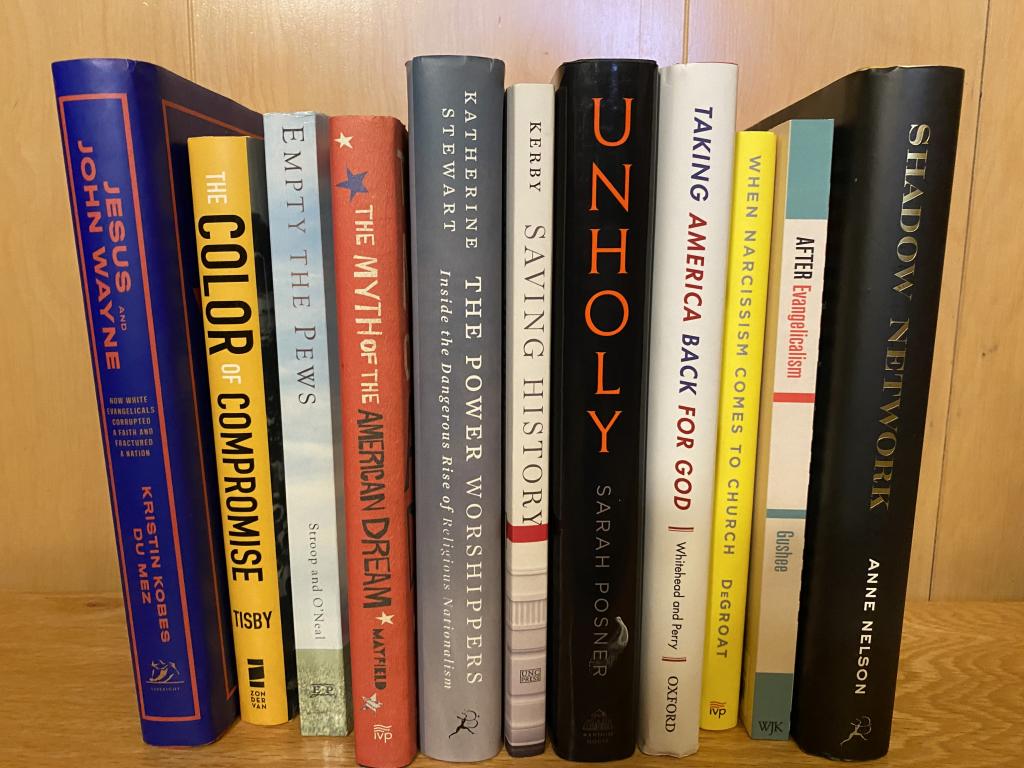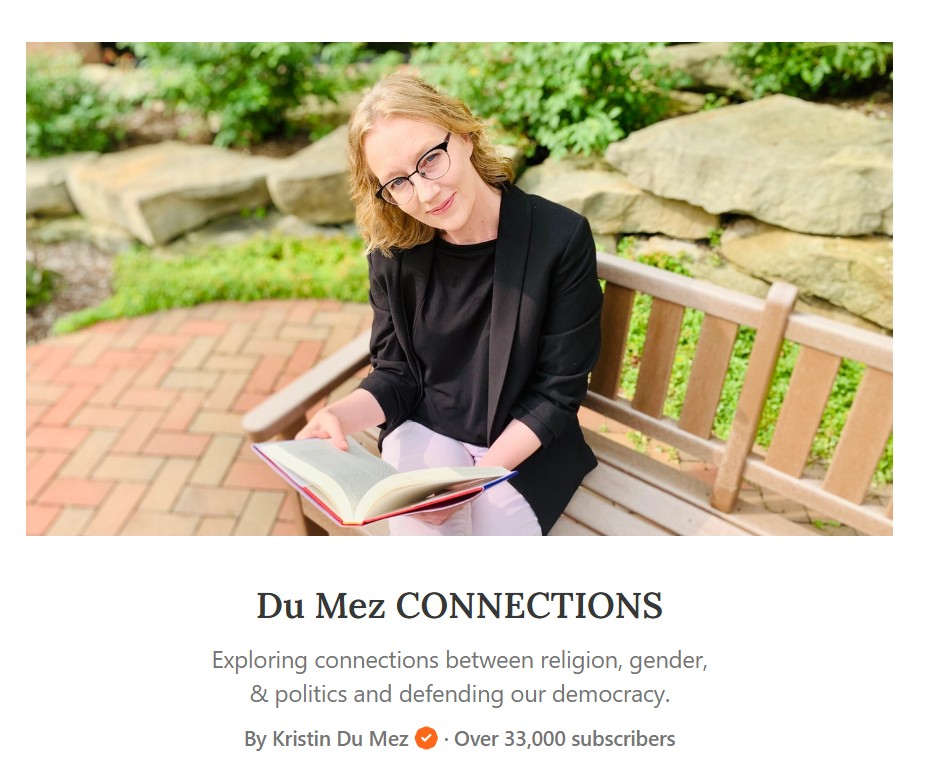We’re three months out now from the release of Jesus and John Wayne, and it’s been a whirlwind of remote talks, podcasts, interviews, and even a couple of documentary film crews. One of the reasons I’ve had so many opportunities to talk about the book is because it touches on so many interconnected themes. It is a book about American politics and the fate of American democracy. It is also about purity culture and sexual abuse and male headship and “biblical womanhood.” It is about militancy and militarism, guns and war, islamophobia and white supremacy. It is a work of history, but it is also framed by an implicit theological critique. It is a book about white evangelicals and, in many ways, it is also a book to white evangelicals
Reflecting on this list, I can’t help but think back to the challenges I faced in weaving together all of these themes into one coherent narrative spanning the last century of American evangelicalism. Kudos to my editor for helping me out at critical junctures.
Having had the opportunity to speak to an array of audiences, I’ve been asked on a number of occasions to recommend further reading. Even limiting myself to new releases, the list of books that connects to themes raised in Jesus and John Wayne is long, and impressive.
First, a bit of background. The months between finishing a manuscript and the book’s publication can be agonizing ones. At least they were for me. As a historian who has until now been accustomed to writing about dead people, the stress of writing a book that ended in the present moment was new to me. Would Trump be impeached? Would white evangelicals continue to support Trump? Would a global pandemic decimate the nonfiction market? (OK, we didn’t actually see that last one coming.) What we did see was the appearance of a number of other new releases exploring related themes. In scholarly circles, this makes for a dynamic field. In trade publishing, this means competition. One after another, books began to appear that addressed various facets of white evangelical politics. (At a certain point, after I told my publicist of yet another competing title about to release, he was reduced to an exasperated “goddammit another one?!”)
Market competition is a real factor. I’ve been edged out at least twice by other authors who landed a coveted op-ed just before mine came across the editor’s desk, and presumably I’ve done the same to someone else. But to be honest, once the books release it doesn’t feel like our work is in competition. On the contrary, it feels as though we’re on the same side. Our works complement each other, provide scaffolding, fill in missing pieces, and reinforce each other’s analysis and conclusions, often in remarkable ways. It seems to me that each of our books is more powerful as part of a larger conversation than any one would be standing alone.
And so, in that spirit, I offer this list of brilliant and compelling books that speak powerfully into this religious and political moment:
On white evangelicals, Christian nationalism, and the fate of American democracy:
Anne Nelson’s Shadow Network: Media, Money, and the Secret Hub of the Radical Right (Bloomsbury) published in the fall of 2019, just after I’d finished copy edits for Jesus and John Wayne. I would have loved to have Nelson’s research on the Council for National Policy at my fingertips as I wrote my own book. It is essential reading for anyone trying to understand the money and power behind the Religious Right. Which really should be all of us right now.
Katherine Stewart’s The Power Worshippers: Inside the Dangerous Rise of Religious Nationalism (Bloomsbury) is a lucidly written exploration of the networks, national and international, that comprise the Religious Right and unite various organizations and institutions in a quest for political power. Stewart makes clear that this quest, fueled by an ardent Christian nationalism, has dire repercussions for American democracy.
Andrew Whitehead and Samuel Perry’s Taking America Back for God: Christian Nationalism in the United States (Oxford) brings empirical rigor into conversations around the Religious Right and Christian Nationalist commitments, and frames that data with compelling interviews that illuminate thinking on a wide range of issues: immigration, gun control, Islam, police shootings, and gender roles.
Sarah Posner’s Unholy: Why White Evangelicals Worship at the Altar of Donald Trump (Random House) offers a chilling account of the xenophobic, racist, and antidemocratic impulses that animate white Christian nationalism. (I had the pleasure of joining Sarah on an episode of Drinking with Historians last month to discuss our books.)
Mike Austen’s God and Guns in America (Eerdmans) and Lauren Kerby’s Saving History: How White Evangelicals Tour the Nation’s Capital and Redeem a Christian America (UNC) also offer valuable glimpses into white evangelical culture and politics.

Finally, Jared Yates Sexton’s American Rule: How a Nation Conquered the World but Failed Its People (Dutton) released just two weeks ago. At a moment when American history has become hotly contested political terrain, the book couldn’t be more timely. Powerfully written, American Rule offers a sweeping critique of the myth of American greatness—a critique offered as an act of true patriotism.
Evangelicalism, and After Evangelicalism:
A number of books appeal directly to evangelicals, offering a vision for religious engagement in politics to counteract the toxic discourse and nationalist delusions of the current moment. Eugene Cho’s Thou Shalt Not Be a Jerk: A Christian’s Guide to Engaging in Politics (David C. Cook) calls on readers to rethink what it means to follow Jesus and reflect his teachings. D. L. Mayfield’s Myth of the American Dream: Reflections on Affluence, Autonomy, Safety, and Power (IVP) challenges readers to consider whether the pursuit of the American dream is compatible with Jesus’ command to love our neighbors as ourselves. Justin Giboney, Michael Wear, and Chris Butler’s Compassion & Conviction: The AND Campaign’s Guide to Faithful Civil Engagement (IVP) offers Christians a path that promises to transcend the binary nature of partisan debates and offer a more fruitful guide to Christian civic engagement. And, released just two weeks ago, Kaitlyn Schiess’s The Liturgy of Politics: Spiritual Formation for the Sake of Our Neighbor (IVP) offers Christians a new approach to politics, one focused on the practices of spiritual formation and rooted in historic Christian tradition.
Many readers of Jesus and John Wayne are evangelicals who are committed to remaining in evangelical churches and communities. But not all. Many former evangelicals are grappling with their formation inside an ideology that they now find harmful, or even toxic. Some have left the Christian faith altogether. Chrissy Stroop and Lauren O’Neal’s Empty the Pews: Stories of Leaving the Church contains twenty-one essays tracing this exodus, offering ex-evangelicals a sense that they are not alone. David Gushee’s After Evangelicalism: The Path to a New Christianity also speaks to those who have left evangelicalism, but it offers a guide for former evangelicals who want to maintain a vibrant Christian faith after abandoning many of the cultural and political truths they inherited. I had the pleasure of blurbing this book as well, and here’s what I had to say: After Evangelicalism is essential reading for those who have found white evangelicalism wanting. Drawing on his own spiritual journey, David Gushee provides an incisive critique of American evangelicalism. But this is not ultimately a work of deconstruction. Gushee offers a succinct yet deeply informed guide for post-evangelicals seeking to pursue Christ-honoring lives, and he does this with such eloquence that the book transcends its immediate purpose and speaks compellingly to all who are exploring how to be Christian in these times.
On Gender, Sex, and Abuse:
Two new books will release next spring that are going to shake up evangelical conversations around sex and gender. The first is The Great Sex Rescue: The Lies You’ve Been Taught and How to Recover What God Intended (March 2) by Sheila Gregoire, Rebecca Gregoire Lindenbach, and Joanna Sawatsky. Gregoire is the bestselling author of evangelical sex guides, but trust me, this book isn’t what you think. I had the privilege of endorsing this book as well, and it is a powerful deconstruction of the devastating myths that have long dominated evangelical understandings of sex and gender. As I wrote in my blurb, if you’ve ever read an evangelical book on sex, you owe it to yourself to read this one.
Beth Barr’s much-anticipated The Making of Biblical Womanhood: How the Subjugation of Women Became Gospel Truth (Brazos, April 20) draws on history and personal narrative to make clear that “biblical womanhood isn’t biblical.” It will join books like Aimee Byrd’s Recovering from Biblical Manhood and Womanhood: How the Church Needs to Rediscover Her Purpose (Zondervan, 2020) to demonstrate how what passes for “biblical” gender roles need to be understood as historical and cultural constructions, not as unfiltered applications of biblical truth.
Another important book for this moment is Chuck DeGroat’s When Narcissism Goes to Church: Healing Your Community From Emotional and Spiritual Abuse (IVP). An expert on Narcissistic Personality Disorder, DeGroat offers a clear guide to identifying, dealing with, and recovering from the harm narcissists cause. It is a timely read with far-reaching implications for understanding abusive systems and those who enable them.
On race and justice:
There are several essential books on racial justice that have recently released, but I’ll list just three that have frequently been paired with Jesus and John Wayne: Robert P. Jones’s White Too Long: The Legacy of White Supremacy in American Christianity, a provocative critique of the white supremacy that runs through American Christianity; Wheaton College professor Esau McCauley’s Reading While Black: African American Biblical Interpretation as an Exercise in Hope (IVP), a powerful presentation of black theological tradition; and Willie James Jennings’s After Whiteness: An Education in Belonging, a book that urges the formation of people “who can gather others together through border-crossing pluralism and God-drenched communion” in order to “cultivate the radical belonging that is at the heart of God’s transformative work.”
Finally, I’m eagerly anticipating the publication of Jemar Tisby’s How To Fight Racism: Courageous Christianity and the Journey Toward Racial Justice (Zondervan, January 2021). Coming on the heels of his NYT Bestselling The Color of Compromise, this beautifully written book guides readers of all races to take the next steps toward racial justice.
Before too long, I’ll also be ready to announce my next book project, which is in some ways the flip side to Jesus and John Wayne. That’s all I’ll say for now, but stay tuned…

